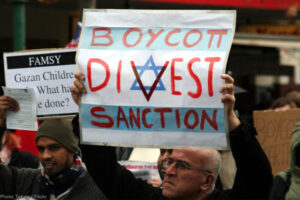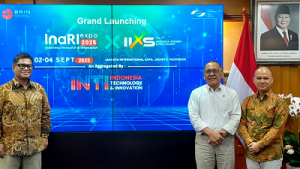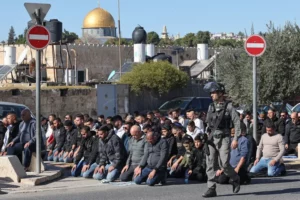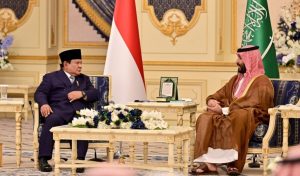 By : DR. H. Wawan Wahyuddin,M.Pd.*
By : DR. H. Wawan Wahyuddin,M.Pd.*
A. Biography Of Hasan Al-Bana
Hasan Al-Banna was born in the Mahmudiyah village region Bahira, Egypt in 1906 AD. His father, Shaykh Ahmad al-Banna is a scholar of fiqh and hadith. Since his childhood, Hasan al-Banna had shown signs of brilliance. At age 12, for the gift of God, little Hassan has memorized half of the Qur’an. The father constantly motivate Hasan to complete the memory. Since then Hasan little disciplined his activities into four. Daytime used to learn in school.
Then learn to make and fix the clock with his parents until the afternoon. The evening until bedtime used to repeat the lessons of school. While reading and reciting the Quran recitation he was doing after praying Shubuh. So no wonder that Hasan al Banna scored brilliant achievements in the future. At the age of 14, he had memorized the entire Quran. Hasan Al Banna graduated from high school with honors at his school and fifth best in Egypt. At the age of 16 , he had been a college student at Darul Uloom.
Also Read: Boycott of Zionism, The Most Powerful Weapon
Thus a series accomplishments of little Hasan. He also has a leadership talent. Since his youth Hasan al-Banna had been always chosen to be student body president at his school. Even still in i’dadiyah (a kind of junior high school), he has been able to solve adult problems, here you are the story :
After school, the students walked through the Mushala. while Hasan was among them. then the call to prayer rang out. The student was immediately rushed to perform ablutions. But suddenly came the priests and drove them away. The priests thought they were still kids. perhaps, he worried that they spend a share of ablutions. Most of the students were running around, while a small holding his place. Experiencing these events, al-Banna took a piece of paper and write a description sentence closed with one verse of the Qur’an.. And do not send away those who call upon their Lord morning and afternoon, seeking His countenance. Not upon you is anything of their account and not upon them is anything of your account. So were you to send them away, you would [then] be of the wrongdoers. (Q. S. Al-An’aam: 52).
And text to be submitted to the priest. After reading it, the priest’s heart was touched. Furthermore, his attitude changed. While the students also agreed to replenish the water into the pond after every prayer. They even took the initiative to raise funds to buy mats for mushalla!
At age 21, he finished his studies at Darul ‘Ulum and was appointed a teacher in Isma’ilism. Hasan Al-Banna is concerned with British colonialism. Period was a time where Muslims were experiencing a great shock. Ottoman (Turkish), as the protector of Muslims around the world collapsed. Muslims were confused. While colonizers casually toying with the Islamic world. Even in Turkey, Kemal Attaturk suppress Islam in his country. Dozens of Turkish scholars in jail. Thus the state of the Islamic world. One of the causes of the decline of Islam is that Muslims are ignorant (stupid) to the teachings of Islam.
Also Read: Nuclear Technology: Harm and Benefit from the Qur’anic Perspective
Hassan Albana started preaching. He invited people to God, invited people to eradicate ignorance. Propagation begins by gathering students to learn. Then he preached in the coffeehouse. This he did regularly every two weeks. Together “Ikhwanul Muslimin,” which he founded, he worked hard day and night to write speeches, conduct coaching, meeting, etc.. The The dawah wide acclaimed among the Muslims of Egypt. They were Muslims from the group of workers / farmers, businessmen, scientists, scholars, physicians support the mission.
During the war between Arabs and Jews (circa 45’s), he mobilized mujahideen. Of all the Arab Forces, there was only one group who feared the Jews, namely the ikhwan volunteer troops. Voluntary Mujahideen kept surging forward, until finally there was a big shame that tarnished the Egyptian government. United States, chum Jews threatened to bomb Egypt if it didn’t attract the Muslim Brotherhood militants. Then there was a tragedy that proves how human cowardice. Thousands of Egyptian jihadists pulled back, and then stripped. By whom? By Egypt government ! Even not only that, the Mujahideen thrown into military prisons. Even some time after that Hasan al Banna, the Ikhwanul Muslimin leader met martyrdom in an event designed by the enemies of Allah.
His proselytizing is international. Even immediately after Indonesia proclaimed its independence, Hasan al Banna immediately expressed support. He kept contact with prominent scholars Indonesia. Logged M. Natsir ever addressed a meeting in front of the Muslim Brotherhood/Ikhwnul Muslimin (note: M. Natsir later became PM Indonesia when RIS turns back into a unitary state). Martyrdom of Hassan al-Banna did not mean his proselytizing was also dissapeared. It is the will of God, that whenever and wherever propagation of Islam will never stop, even though the enemies of Islam desperately trying to extinguish it.
They want to extinguish the light of Allah with their mouths, but Allah will perfect His light, although the disbelievers dislike it. (Q. S. Ash-Shaff: 8)
Also Read: Gaza Cries Out, the World Stays Silent: A Wounded Humanity
The days after the death of Hasan al-Banna, was a terrible time for the Muslims in Egypt. Many of his disciples who were tortured, thrown into prison, even killed, especially when Egypt in command by Abdul Jamal Naseer, a leaning to the Soviet dictator. Many of the students was forced to flee abroad, even to Europe. Become refugees for them were not something be regretted. For them no matter where was the God’s earth, wherever was the dakwah land. Observers indicated, propagation of Islam in the West is not separated from their toil. Thus, torture, pressure, murder will not extinguish the light of God. In fact, everything seemed to be a light of dakwah itself, so that the message of Islam continued to spread widely.
Among the works of his famous successors was Fi Dzilaalil Qur’an (under the auspices of the Quran) by Sayyid Qutb. A book of Qur’anic exegesis highly weighted in this contemporary era. Our scholars make it as a reference translation of the Quran in Indonesian. Among them are Al-Qu’an and its translation from religious affairs department, then Tafsir of Al-Azhar by Buya Hamka. Know him shall be more complete when we know his principles and beliefs.
The following are the principles that he always held steadfast in his preaching:
I believe: “Behold all affairs to Allah. Prophet Muhammad is our lord, the Seal of the Prophet who was sent to all mankind. Verily the Day of Judgement it haq (forthcoming). Al-Quran was the Book of Allah. Islam is legislation equipped to govern the lives of the next world. “akhirat.”
Also Read: Indo Defence Expo and Forum; Sharing Responsibility of Humankind and Environment
I pledge: “I’ll set yourself up in accordance with the Qur’an and hadith. I’ll learn Sirah of the Prophet and his noble companions.”
I believe that istiqomah, glory and science are parts of Islam.”
I promise: “I would be a istiqomah in running the service and stay away from all misguidance. Keeping the noble spirit and away from the bad character.
I will take Islamic role as my habit as well as I can. Prioritize kinship and affection in law enforcement and in court.
Also Read: Safiya Saeed: From Somali Migrant to First Hijab-Wearing Mayor of Sheffield
I will not go to court unless forced to, I will always run the teachings of Islam. Trying to spread the knowledge useful to all mankind.
I believe: “A Muslim is required to work and earn a living, in his property there is haq and he must give the haq to people in need”
I promise: “I will try to make a living and saving for my future. I will give charity and set aside a portion of my wealth for positive activities. I will support all Islamic economic projects. I will take domestic production and other Muslim countries into my priority. I will not do the riba transaction in all matters and does not involve itself in the luxury that beyond my ability.”
I believe: “A Muslim is responsible for his family, among their obligations to maintain health, faith and conviction and their morals.”
Also Read: Why Food Safety is Essential During Hajj Services?
I promise: “I will work hard. I’ll menyebarakan teachings of Islam on the rest of my family. I would not put my children to school who can not keep the faith and conviction and their morals. I would reject the entire media, bulletins and books as well as unrelated to the associations that are not oriented to the teachings of Islam.
“I believe:” Among the duties of a Muslim is to revive the glory of Islam by arousing his people and restore the law, the banner of Islam should be the role model of humanity. Duties of a Muslim to educate the world according to Islamic principles. “
I promise: “I would earnestly in carrying out this mission in my life and I have sacrificed everything for the implementation of the mission.
“I believe: “That the Muslims are a people bound in one aqidah of Islam, that Islam which instructs its followers to do good (ihsan) to all the people.”
Also Read: Indonesia Sign Language Mushaf Qur’an; A Sustainable Gift in Celebrating Pancasila Birthday
I promise: “I will exert all efforts to strengthen the bonds of brotherhood between Muslims and erode the divisions and disputes among their factions.”
I believe: “the real secrets of the decline of Islam, because they are away from the” deen “(religion), and the basics of repairing it is a return to the teachings of Islam and its laws, it is all possible if any of the Muslims to work for it. “
B. Moral Education, According to Hasan al–Banna
Tarbiyah in the Indonesian language at the simplified mean to be “education, in the terminology of the Ikhwan is not a simple activity. He is the foundation for the movement of Ikhwanul Muslimin, Ikhwan Tarbiyah designation for Al-Ikhwan al-Muslimin and the organization can not be separated from the founder and the ideology namely Hasan al-Banna. Meaning, if the mention of the Ikhwan as an organization, then it is also the opinion of Hasan al-Banna. Tarbiyah is a very unique procession education, whether from shape or material presented. Even tarbiyah procession is also a member of a highly effective addition. It can be seen from the words of Hasan al-Banna as follows:
Also Read: Leila Khaled, The Icon of Palestinian Women’s Resistance
سَتَعْلَمُ هَذِهِ اليَفْظَةَ عَمَلَهَا فِى الفَرْدِ فَإِذَا بِهِ نَمُوْذَجِ قَائِمٌ لِمَايُرِيْدُهُ الإِسلاَمُ فِى الْفِرْدِ إِنَّ الإِسْلاَمَ يُرِيْدُ فِى الْفَرْدِ وَجَدَانَا شَاغِرًا يَتَذُوْقُ الْجُمَلَ وَالْقَبْحَ، وَاِدْرَاكًا صَحِيْحَا يَتَصَوَّرُ الْصَوَابَ وَالْخَطَأَ …
“The rise of this spirit will take effect within a Muslim. He became a private figure, as desired by Islam. Indeed, Islam wants every believer in self -feelings and down the sensitive, so it can distinguish between good and evil. Islam also wants the right view in understanding what is right or wrong …”.
It will not be realized unless the tarbiyah managed in a distinctive manner and follow the way taken by the Prophet in shaping the initial generation ie:
رُهْبَانٌ فِى الَّيْلِ وَفُرْسَانٌ فِى النَّهارِ
Also Read: The Twilight of the Zionist Israeli State
“Like a devout monk who worship at night and like a warrior horsemen astute at noon”
Tarbiyah (education) among the Ikhwan (Brotherhood) is defined as “the process of creating pious people, in order to build a balance in term of potential, goals and actions as a whole. Therefore, all dimensions of life are integrated in the procession of education, including in the very fundamental aspect of good character, It can also look at the words of Hassan al-Banna as follows:
ثُمَّ أَوْضَحَ الْحَقِّ تَبَارَكَ وَتَعَالَى لِلنَّاسِ بَعْدَ ذَلِكَ الرَّابِطَةِ بَيْنَ التَّكَالِيْفِ مِنْ صَلاَةِ وَصَوْمٍ بِاالتَّكَالِيْفِ الإِجْتِمَاعِيَّةِ وَأَنَّ الأُوْلَى وَسِيْلَةُ لِلثَّانِيَةِ، وَأَنَّ الْعَقِيْدَةَ الصَّحِيْحَةَ أَسَاسُهَا مَعًا، حَتَّى لاَيَكُوْنَ لأُنَاسٍ مَنْدُوْحَةٍ مَنَ الْقُعُوْدِ عَنْ فَرَائِضِهِمُ الْفَرْدِيَةِ بِحُجَّةٍ أَنَّهُمْ مَشْغُوْلُوْنَ بِعِبَادَتِهِمْ مُسْتَغْرِقُوْنَ فِى صَلَتِهِمْ بِرَبِّهِمْ، فَمَا أَذَقَ وَمَا أَحْكَمَ (ومن أحسن من الله حديثا)
“Allah also describes the relationship between the obligations of individuals such as praying and fasting with social obligations. The first obligation is a means towards the implementation of such obligation, and Second, the correct Akidah is the basis for both. So one is not justified to leave the individual’s obligations by reason of busy carrying out social obligations. Conversely, one is not justified to leave the social obligations by reason of busy with the obligations of individuals, busy worship and connect with Allah. It’s a formula that balanced and perfect policies. Who better words than the words of God?”
Also Read: Prof. Abdul Fatah El-Awaisi and the Intellectual Roadmap for the Liberation of Al-Quds
This balance according to the author based on an understanding of Hasan al-Banna of the Qur’an and the Hadith of the Prophet Muhammad. This is the balance of life of the world hereafter. Can be seen in the word:
But seek, through that which Allah has given you, the home of the Hereafter; and [yet], do not forget your share of the world. And do good as Allah has done good to you. And desire not corruption in the land. Indeed, Allah does not like corrupters.” (Al-Qashash : 77)
Say, “Who has forbidden the adornment of Allah which He has produced for His servants and the good [lawful] things of provision?” Say, “They are for those who believe during the worldly life [but] exclusively for them on the Day of Resurrection.” Thus do We detail the verses for a people who know (Al-A’raf : 32
Say, “Shall I inform you of [something] better than that? For those who fear Allah will be gardens in the presence of their Lord beneath which rivers flow, wherein they abide eternally, and purified spouses and approval from Allah . And Allah is Seeing of [His] servants – (Ali-Imran: 15)
In the hadith of the Prophet can also be seen, as follows:
Of Tamim Al-Daary ra that Rasulullah SAW said: “Religion is a guide (for humans) he repeats three times, we asked:” For whom, ya Messenger of Allah?, He said: ” people guide to do good to Allah, His kibat , His rasul, leaders of the Muslims and to Muslims in general “. (H. R. Muslim).
Ibn Umar that the Prophet SAW said: “The believer who can mingle with humans and be patient with their disorder better than that does not mix with them and not be patient with their disorder.” (H. R. Ibn Majah).
This alone can be seen, but if seen more in that what had been done by Hasan Al-Banna is a continuation of the struggle of Salafus Shaleh and perfect understanding of the Qur’an and the Hadith, because he himself has always made the two guidelines as Manhajul Hayah.
According to Drs. Yusuf Al-Qaradawi that such education is education that robbani, whose sole purpose is to form a man who is faithful, not only just but he is more pronounced and lasting impact in the psyche and behavior of mutarabbi.
الْجَانِبُ الرَّبَانِي أَوِالإِيْمَانِى فِى التَّرْبِيَّةِ الإِسْلاَمِيَّةِ كَمَا فَهِمَهَا الإِخْوَانُ وَطَبَقُوْهَا هُوَ اَهَمَّ جَوَانِبِ التَّرْبِيَّةِ وَإِشَّدُهَا خَطْرًا وَأَعْمَقُهَا أَتْرًا، وَذَلِكَ الأَنَّ أَوْلَ هَدَفِ لِلتَّرْبِيَّةِ الإِسْلاَمِيَةِ هُوَ تَكْوِيْنُ الإِنْسَانِ الْمُؤْمِنِ. [1]
Moral education (tarbiyah khuluqiyah) including the most important function in education. Aspect of morality is one of the foundations. Even as a whole, education is a moral activity, either expressed or implied.
Hasan Al-Banna once said in a seminar at Daarul Ulum, “Morality is the essence of the whole aspect of personality that is straight”, the Prophet very concerned about this aspect.
Moral education according to Hasan al-Banna should be based on some basic principles, namely: the existence of moral readiness for change, changing morals might be conducted through the enabling environment if there is a landing and a good example and imitate his example.
Moral education (khuluqiyah) is central to the whole aspect of personality. The aim is that every human being has an organized conscience (yaqish adh-permissible). Conscience is a controller for all his behavior. In addition, a solid moral formation (al-Matin khuluq) that is behaving in a number of Islamic morality. Every individual makes a main character as a reference and guidance that can not be violated.
- A. Moral Education Methods According to Hasan al-Banna
The method is carried out in general education in the Ikhwanul Muslimin organization aims to instill the principles of the movement into the soul of every mutarabbi. Among the basic principles that must be embedded in the beginning of this education are:
- Islam is a complete system that governs every Muslim problem. Islam has laid down a system that regulates and tidy for every Muslim. Islam was never silent or passive in the face of all problems of life and the rules necessary to improve the human.
- The task is to lead the life of the Muslim world and to guide all mankind to the teachings and the Islamic system in which the absence of Islam, then human life will not achieve happiness.
- We do for mankind in the way of Allah (Fisabilillah) exceeds our charity to ourselves.
- Islamic Da’wah will not be ideal except for people who already understand all dimensions, and she/he sacrificed for it by treasure, time, health and his own soul.
Methods of moral education should be done necessarily instill those basic principles to students (mutarabbi) with packing method is:
- Balanced education
- Catholicity
- Faith
- The role and methods of understanding the Qur’an
Dr. Mutawalli Joseph Syabili or better known as Raa’uf Syalabi argued that educational methods of the Muslim Brotherhood stands on three basic, namely bai’at, usrah and-wirid wird. Bai’at not the lessons that must be memorized. However bai’at are rules that must be done, because bai’at devoted to the Brotherhood (Mutarabbi) who believe in the glory of their propaganda, the sanctity of their thinking and they try earnestly to live with it or die in the course. The pillars are 10 bai’at it is: Understanding, Ikhlas, Amal, Jihad, Sacrifice, obey, Steady, Focus, brotherhood and trust.
اَرْكَانُ بَيْعَتِنَا عَشَرَةٌ فَاحُفَظُوْهَا: اَلْفَهْمُ، وَالإِخْلاَصُ، وَالْعَمَلُ، وَالْجِحَادُ، وَالتَّضْحِيَّةُ، وَالطَّاعَةُ، وَالثَّبَاتُ، وَالتَّجَرُّدُ، وَالأُخُوَةُ، وَالثَّقَةُ. [2]
This method of education in general is created or compiled by Hasan al-Banna as a code of ethics that must be considered by mutarabbi / learners. This method requires behavioral cues and the obligation to implement it for mutarabbi amaliyah or learners. Instructions were summarized in four types, namely:
- Form of real behavior as a consequence of bai’at
- Ten obligations that must be reflected in Muslim personal
- Ten damage door that should be shunned
- Ten safety door to avoid the sins large and small.
Among the educational methods of Hassan al-Banna is an usrah system organization. It is a system derived from the values of Islam, this is because Islam is concerned to establish and strengthen relationships among fellow Muslims. The system is based on three pillars namely introduction (Ta’arij), mutual understanding (Tafahum) and look after each other (Thafakul).
Among the programs carried out in usrah system is the study tour, the morning prayer in congregation and mabit which aim to maintain the character and continue to control each other in carrying out activities. Islam suggest the need of establishment of Islamic usrah from his followers, who can guide them to the peak ideals, strengthen the heart and elevating ukhuwah, from theory to reality and real charity.
يَحْرُصُ الإِسْلاَمُ عَلَى تَكْوِيْنِ أُسْرَ مِنْ اَهْلِهِ بِوَجْهِهِمْ إِلَى الْمِثْلَ الْعُلْيَا وَيُقَوِّي رَوَابِطُهُمْ، وَيَرْفَعُ أُخُوَّتِهِمْ مِنْ مُسْتَوَى الْكَلاَمِ وَالنَّظَرِ يَاتِ إِلَى مُسْتَوَى الأَفْعَالِ وَالْعَمَلِبَاتِ. [3]
Furthermore, among the methods of education of Hasan al-Banna was wirid. Education soul, feelings, conscience and held up to the level of purity, keep yourself and reaching for the pleasure of Allah is a major problem in the education of Hasan al-Banna. This we can examine his words in his book of Majmu’atur Rasa’il as follows:
… وَأَهَمَّ مَا نَعُوْلُ عَلَيْهِ فِى نِمَائِهَا وَظُهُوْرِهَا وَانْتَشَارِهَا هَذِهِ الْيَقْظَةِ الرُّوْحِيَّةِ الْمُرْتَجَلَةِ … [4]
“… The most important thing that should receive attention in our mission and our most cases that we must keep is the resurrection of the spirit …”.
From this explanation the authors observe again that Hasan al-Banna was again always makes the Qur’an and Hadith as the basis of moral educational activities. Reading the Qur’an is the most important practices in shaping the character and makes the heart grow callous. Allah says in the Qur’an Surah Al-Fathir: 29-30, which means:
Indeed, those who recite the Book of Allah and establish prayer and spend [in His cause] out of what We have provided them, secretly and publicly, [can] expect a profit that will never perish.That He may give them in full their rewards and increase for them of His bounty. Indeed, He is Forgiving and Appreciative.
From Mu’adh Bin Anus ra, the Prophet Muhammad SAW said:
مَنْ قَرَأَ الْقُرْأَنَ وَعَمَلَ بِمَا فِيْهِ أَلْبَسَ الله وَالِدَاهُ تَاجًا يَوْمَ الْقِيَامَةِ ضَوْءُهُ أَحْسَنُ مِنْ ضَوْءِ الشَّمْشِ فِى بُيُوْتِ الدُّنْيَا لَوْكَانَتْ فِيْكُمْ فِمَا ظَنَّكُمْ بِالَّذِى عَمَلَ بِهَذَا؟ (رواه أبو داود).
“Whoever reads the Quran and practice it, then God will put a crown to her parents on the Day of Resurrection a better light than the sun in the world, then what do you reward people who practice it?”. (H. R. Abu Daud).
From Abdullah Bin Mas’ud r.a., the Prophet Muhammad SAW said:
إِقْرَؤُوْا الْقُرْآنَ فَاِنَّ اللهَ تَعَالى لاَ يُعَذَّبَ قَلْبًا وَعَى الْقُرْأَنَ، وَإِنَّ هَذَا الْقُرْآنَ مَادُوْبَةُ اللهِ، فَمَنْ دَخَلَ فِيْهِ فَهُوَ أَمَنَ وَمَنْ أَحَبَّ الْقُرْأَنَ فَلْيُبَشِّرْ. (رواه الدرامى).
“Read the Qur’an because God will not torture the heart of memorizing the Quran and indeed the Koran is the banquet of God then those who enter into the banquet that he was safe, people who love the Quran ‘he’s happy “
The focus of educational methods that Hasan Al-Banna does on the following points:
Reading the Qur’an, listening (Istima ‘) and understand it. The Qur’an is read along with tadabbur and a sense of solemn, and then tried to take lessons in the path of righteous living. The reader should focus his mind when reading the Qur’an and trying to memorize each according to ability;
- Reading much hadiths of the Prophet SAW and memorizing part of it;
- Studying sirah (biography) and the history of the Salaf;
- Studying Ushuluddin treatise (the basics of religion) and practical issues (furu’) fiqh;
- Reading and reviewing the messages of Ikhwanul Muslimin missions, newspapers, magazines of ikhwan and others, such as books preaching, education and books that talk about the realities and problems of the Muslims.
- Training people capable of lecturing and preaching to the practice directly by memorizing poems, proverbs and dakwah material, then assigned him to teach and give lectures. First performed in this limited environment and then to a broader area….
- B. Hasan Al-Banna’s efforts in Moral Education
Efforts made in his character education is character education principles they hold, that is moral conversion requires a conducive environment that will lead to the morality that is expected and a figure who should be role models, then familiarize themselves so firmly entrenched in the self. This is very important in moral education, both in congregational Brotherhood and at school.
To Achieve objective of moral and religious education’s effectively, he must go through the methods of practice by training learners practice their religion, giving religious guidance, also practicing writing of religious studies in school magazines. Besides organizing study tours together, teachers and students, to provide an aspect of exemplary behavior in a place free. They also looked very need for a conducive school environment by providing teachers with the preparation of a good religious educative, encouraging students to form groups of religious reform in the context of the development of soul and mind, as well as encouraging them to be a public speaker, founded the mosque schools, prayer zhuhur congregation there, girls and teachers are emphasized to wear hijabs.
Authors examine how Hasan al-Banna behave on learners whose not getting guidance. Through the columns in the monthly magazine “Al-Ikhwan Al-Musklimun” edition of 56, year the 3rd, Wednesday 4 April 1945, there was a 21-year-old young man who had given up on his condition is stuck on the youth who dissipate, filling something that is not useful. First, motivated him with hope that people with easy to live with truth and goodness. Second, he provides a solutiont is always interacting with people who have piety, goodness and istiqomah. Always felt the supervision of Allah SWT., Using spare time to do pious charity. Doing religious duty and praying n to Allah SWT., in order to get guidance on the right path
According to the authors this is approach from the heart.. capable of affecting the human heart and soul of the questioner. Moreover, an act which he said was he doing in his life so that his words right on target. As the young man’s response was that the columns filled with beauty. It is also a way of Hasan al-Banna in improving the morals of society.
Efforts are done to followers by providing theoretical guidance. It can be seen from the writings and lectures he delivered. For example, Ahaditsul Friday, Hadith Tsulatsa, treatises and an-nasihah yaum program. Besides, it was supplying a good example. This is evidenced by the first Murshid Hasan al-Banna.
Another effort that does is set up Jum’ah schools (School of the New Generation), nasyid-nasyid oriented to the strengthening of the religious spirit, drama and dialogue, mahfuzhat (memorizing), exercise and play sports together. Not only this they also set up special schools in the formal sense with the Ministry of Education curriculum with additional materials that are not taught in secular schools.
To complete it all, the authors will describe some of the noble character that is owned by Hasan Al-Banna and his followers. Hasan Al-Banna has a very high morals and Islamic stunning appearance and witnessed by people who had met him briefly or long.
Among his characters: Honest and true as as quoted by Farid Nu’man in “Hasan al-Banna, Al-Jil Ustadzu” is mentioned, “Among the character of Hassan al-Banna that stands out is honest and true.” He has never expressed an opinion, but consistent with himself, others and his Lord.
Even under bad conditions, he remains consistent with honesty. “When the committee will gather at our residential home of Hajjah Khadrah Sya’irah in Damanhur ..police apparently noticed our plans. Police also raided our hostel. Homeowners to answer. “They come out since the morning and has yet to go home”. He said this while continuing to clean up the garden, The answer of course lies and not convenient. I come out to officials who asked earlier. I explained the real case.
Meanwhile Mrs. Hajjah looked frightened, when I dialogue with enthusiasm.. I say that he possesses the spirit of nationalism requires that they should exist on our side, not just hinder our actions. I became not understand why. Finally, he actually accepted my words. After he heard my words, he went out and set the army to disband. I went back to see friends who had been hiding. I told them. “That’s the blessing of honesty”. We must always honest and always ready to assume our responsibilities. There should be no reason to do a lie forever no matter the circumstances.
Second. Polite and Tawadhu Tilmisani Umar says in “Al-Jalil Ustadzu”, “Truly tawadhu character of Hasan Al-Banna is very high. He never sat at the forefront of an assembly. He is different than anyone else, except for once requested him passionately to sit forward. If the prayers at the mosque, he never barge to become priests.
He considers all the scholars is his teacher. Yet precisely he is their teacher, he speaks to parents and young people with courtesy, gentleness, and tawadhu. Listeners felt acquire knowledge from him. Never once did he cornered the ‘alim or blame.
Third. Zuhud and Simple. a Western writer, Robert Jackson, once commented about the life of Hasan al-Banna in “Ar-Rajulul Qur’an”. Hasan Al-Banna’s house is an example of asceticism. You can see him in a room that was approached by a simple mat. In the same place, you will be able to see it different than anyone else, except a strong beam of light emanating from both his eyes.. so not everyone can meet face to face with him. His performance is understated and a thin beard shows the simplicity and dignity
From his various visits, you will find it as a simple. Sometimes he slept in the hut, sitting on a straw, or eating a simple meal that was served. Only one thing he asked was the person not to understand it as a sheikh of a stream or a greedy tarikat of earthly life.
He once told me (Robert Jackson) that he had visited an area and do not know a single person from the population. After praying, he chatted with the congregation on matters relating to Islam, but it is not uncommon for people who passed away. Finally, he slept on top of the mosque, padded bags and blankets turban.
“The trip, said Robert Jackson added that he did for 15 years. In addition, he visited more than 2000 villages and each village was visited several times. He brings a myriad of science, understand the history of new and old, families, tribal clans, villages with all the events and excess. Of the various visiting, you can see Hasan al-Banna lived very simply, sometimes he was in decrepit shack, sitting on the ground and take potluck.
Fourth. Powerful and Easy No Complaining. A close friend of Hasan al-Banna told me about his visiting with him, “One time we drove between Mecca and Medina. I felt dizzy, he was not feeling it. We ate many different types of food that my stomach was sick, he was okay. We entered the air of Mecca after leaving Egypt the cold air. As a result, I got pucak and cough, while he did not feel tired at all after the walk and ride to the cave of Hira. I am annoyed with various difficulties, he still smiled readiness. My heart is moaning and muscle fatigue, while he remained calm and answered our violent mental aridity
Fifth. Strictly enforce the truth, in fact, the British colonizers continue to monitor his movements. Occupiers know the influence and danger of people like Hasan al-Banna. The British did various enticements to persuade him. Perhaps, he is the kind of people are easily tempted by the wealth and position.
The British Embassy had asked Hasan al-Banna to speak about democracy on the radio in exchange for 5000 pounds. Al-Banna’s answers to them, “Well, I’m willing to do so without remuneration in accordance with the understanding and my perception of what you call democracy.” “They said, just say according to British perceptions and their allies even against humanity”. Hasan Al-Banna replied, “Depart from here you guys! You have strayed from the right path and deviated from the truth “.
One day Hasan Al-Banna received a call from Ra’is An-Nihayah (representative director) in Cairo for the interrogated. Before entering the office, a lawyer offered to be his lawyer. However, Hasan al-Banna’s lawyers saw the lawyer smoking, and it was the holy month of Ramadan. Then he said, “We do not ask for help to the sinner in order to obey God.
There are many other heroic stories are full of ‘ibrah from him in amar ma’ruf nahi mungkar, such as al-Banna dirctly warned to a judge who wear rings and feed use containers made of silver even though the judge was a great man
Sixth. Very closely with the Pious People and Ulama, close to the righteous and the scholars was one of al-Banna habit that stands out and has been seen since childhood and youth. He even pushed and encouraged scholars to do a lot of improvements in Egypt when they were listless. He moves with the clergy to make changes, combat moral degragation, awaken the people, and awaken the authorities. He was very close to a hadith scholar missionary, dakwah figure of sulfa – Shaykh Al-Khatib Muhibbudin whos was already familiar when active in the Muslim Syubbanul.
He is also active in science assemblies Syaikli Mujaddi Sayyid Al-Reda Rassyid – a Salafi reformer, teacher of hadith teachers contemporary scholars and writers interpretation “Al-Manar” is famous for. In fact, after Rashid Rida passed away, Al-Banna believed to scientists around to become regular writers.
In addition to the two scholars, he also has a good relationship with Shaykh Muhammad Husayn al-Khadhir, East Basya Ahmad, Ad-Dajawi Sheikh Yusuf, Shaykh Abdul-Azizi Al-Khuli, Shaykh Muhammad Al-Adawy, Shaykh Abdul Aziz Jawisy, Shaykh Abdul Wahhab An-Najjar and Shaykh Muhammad al-Khudri.
If seen from the results of his upbringing, we were told that a member of the Ikhwan named Ali Abu ‘Ali was a driver, often late into the evening meetings have been scheduled. When looking for news about his condition, it is known that he was forced to sell his bike for charity to pay his share in the construction of mosques and meeting places. As for the delay, after coming home from work he had to travel 6 km on foot commute every day.
Other members of Ikhwan who admire the spirit of this good, then they voluntarily raise money and buy a new bike for the gift to him, as a sign of respect for his great sacrifice, noble depraved, and his commendable.
REFERENCES
Al-Banna, Hasan, Majmu’atur Rosail, h. 16, h. 70, h. 132-135 & h, 390
_________Risalah, Tarbiyah, Imam Hasan Al-Banna, (Jakarta: Pustaka Qalami, 2004), h. 222-227
Al-Qardhawi, Yusuf, At-Tarbiyah Al-Islamiyah Wa Madrasah Hasan Al- Banna, (Mesir, Al-Ittihad Al-Islami Al’Aly, 1983).
Atsqolani, Ibnu Hajar, Bulughul Maram, (Surabaya: Darul Ilmi).
Hamalik Psikologi Belajar dan Mengajar (Bandung : Sinar Baru Algensindo, 2002)
Ibnu Rasyid Kaitan Filsafat dengan Syari’at (Jakarta : Pustaka Firdaus, 1996)
Ismail Nurul Huda, Abdul Khalik Paradigma Pendidikan Islam (Yogyakarta : Pustaka Belajar, 2001)
Jamaluddin, Aly Abdullah Kapita Selekta Pendidikan Islam (Bandung : Pustaka Setia, 1999)
M. Thalib 20 Kerangka Pokok Pendidikan Islam (Bandung : Irsyad Baitus Salam, 2001)
________25 Asas Islam Mendidik Anak (Bandung : Irsyad Baitus Salam, 2001)
M. Qurais Syihab Membumikan alQuran (Bandung : Khazanah Ilmu Islam, 1997)
M. Athiyah al-Abshori Dasar-dasar Pokok Pendidikan Islam (Jakarta : PT. Bulab Bintang, 1970)
Nu’man Farid, Al-Ikhwan Al-Muslimin Anegerah Allah Yang Terzalimi, (Depok: Pustaka Nauka, 2004).
Oemar Hamalik Kurikulum Pelajaran (Jakarta : Bumi Aksara, 2005)
Ruslan, Utsman Abdul Mu’iz, Tarbiyah Siyasiyah; Pendidikan Politik Ikhwanul Muslimin, (Studi A nalisis Evaluatif Terhadap Proses Pendidikan Politik “Ikhwan” Untuk Para Anggota Khususnya dan Seluruh Masyarakat Mesir Umumnya, dari Tahun 1928 Hingga 1954, (Solo: Era Intermedia, 2000).
Ramayulis Ilmu Pendidikan Islam (Jakarta : Kalam Mulia, 2002)
Sindu Galba Pesantren Sebagai Wadah Komunikasi (Jakarta : PT. Asdi Mahasatya, 1995)
Said Aqil Siraj Pesantren Masa Depan (Bandung : Pustaka Hidayah Cipta, 1999)
Syalabi, Raa’uf, Jiwa Yang Tenang Lahirkan Ide Cemerlang, (Jakarta: Nuansa Press, 2004).
Yakan, Fathi, Revolusi Hasan Al-Banna (Jakarta: Harakah, 2002).
Zuhairini dkk, Sejarah Pendidikan Islam (Jakarta : Bumi Aksara, 1995)
___________ Filsafat Pendidikan Islam (Jakarta : Bumi Aksara,
*The writer is a lecturer at graduate The State Institute for Islamic Studies “Sultan Maulana Hasanuddin” Banten, Indonesia.
Mi’raj News Agency (MINA)



























 Mina Indonesia
Mina Indonesia Mina Arabic
Mina Arabic